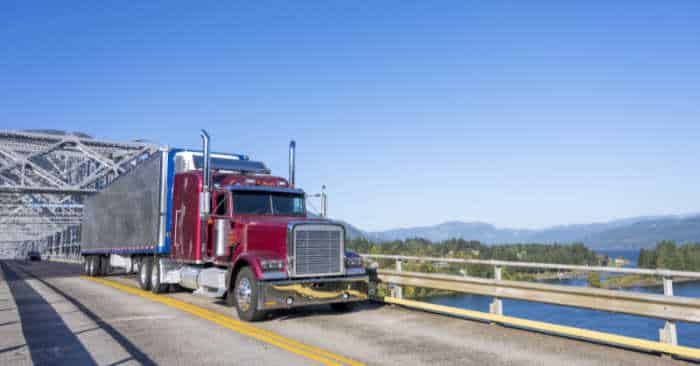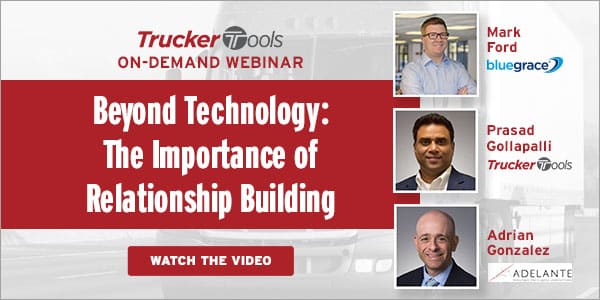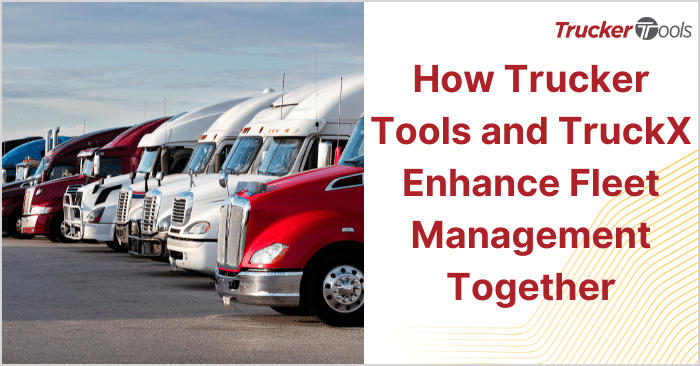Adrian Gonzalez of Talking Logistics recently sat down with BlueGrace Logistics’ Chief Operating Officer Mark Ford and Trucker Tools’ Founder and CEO Prasad Gollapalli to talk about how relationships continue to be the driving force behind success in the logistics industry. The webinar included an in-depth discussion of how relationships between brokers/3PLs, tech vendors, carriers and shippers have changed over the last decade and the increasing influence that technology has on these relationships. Technology not only provides scalability and operational efficiency to brokers/3PLs. It also can offer greater convenience for carriers, elevate the service offered to shippers and give internal teams the tools they need to do their jobs well.
To learn more about how technology can foster relationship-building across the board, check out these highpoints from the discussion.
Why Logistics Is Still a “People Business”
“Relationships are still important today, but you need to have a technology partner with the relationship,” said Ford. “Our business has morphed into something where you want to create efficiencies and carriers are the same way. There are certain things that they don’t like to do either. It starts with the relationship, but over time that relationship can soften if you don’t have the supplemental pieces that make their jobs easier, too.”
Ford went on to say that good carrier relationships help BlueGrace Logistics keep capacity “in house” and reduce the chances of having to go to market and use new carriers with whom the company hasn’t previously worked. In Ford’s view, carriers are looking to build relationships with brokers and 3PLs. Carriers want long-term relationships that can help them fill their network so that they don’t have to worry about keeping their trucks on the road. According to Ford, both carriers and brokers/3PLs want to move away from transactional relationships, placing higher value on consistency and long-term partnerships. Strong relationships with brokers have a trickle-down effect on carriers’ ability to retain drivers.
“Carriers want to have some sort of consistency where they know you’re going to have this specific type of freight on these days, they’re familiar with where it’s picking up and where it’s delivering because it’s important for them in terms of driver retention,” Ford said. “The relationship with a carrier starts with what kind of freight you have available, but it also bleeds down into how you operate, how easy it is for a carrier to do business with you and how that helps them interact with their employees.”
How Technology Impacts Internal Teams and Your Ability To Secure Capacity
“If you know anyone that’s ever been in a 3PL or that’s worked on the carrier side of the business, you know that it’s a difficult job,” said Ford. “If you don’t show your internal teams that you’re working on making their jobs more enjoyable, your relationships aren’t going to matter. Carriers want consistency. They want to know they have someone on their side. If you’re just focused on external relationships, but you’re not doing anything internally to supplement that and give your internal people the ability to take advantage of some of those technological resources, then they’re going to have a hard time facilitating relationships with carriers on their side.”
“If you know anyone that’s ever been in a 3PL or that’s worked on the carrier side of the business, you know that it’s a difficult job,” said Ford. “If you don’t show your internal teams that you’re working on making their jobs more enjoyable, your relationships aren’t going to matter. Carriers want consistency. They want to know they have someone on their side. If you’re just focused on external relationships, but you’re not doing anything internally to supplement that and give your internal people the ability to take advantage of some of those technological resources, then they’re going to have a hard time facilitating relationships with carriers on their side.”
Last year BlueGrace Logistics implemented Trucker Tools’ real-time freight tracking platform in its operations, integrating the platform with its proprietary TMS. BlueGrace performed a thorough evaluation of several different visibility solutions prior to implementation and ultimately chose Trucker Tools’ platform because it simplifies workflows for carriers, reduces check calls, increases internal productivity and delivers an overall lower cost. Trucker Tools’ technology makes the lives of BlueGrace’s employees easier, reducing focus on repetitive tasks and shifting it to exception management. At the same time, Trucker Tools’ freight tracking provides a streamlined, more efficient experience for carriers and allows the 3PL to better meet shippers’ needs. All of the above makes it easier for BlueGrace to foster relationship-building with carriers and shippers.
A Symbiotic Relationship Between Tech Vendors and Brokers/3PLs
“When we first spoke to Mark, the questions that he asked were completely different compared to what 3PLs and brokers asked tech vendors 10 or 15 years ago,” said Gollapalli. “It’s not about where Trucker Tools’ platform is today or where our technologies are today. The questions that Mark asked us were about where we are going next and what’s on our roadmap. Brokers and 3PLs aren’t necessarily trying to manage where we’re going as a technology provider, but they want to see how much of their feedback goes into our product development. That’s a day and night difference between where we were ten years ago. It’s the new direction of our industry. We’re working together to solve the issues of this industry and that to me is the biggest change that we’re seeing in today’s world.”
Ford agreed, saying that BlueGrace Logistics’ approach to technology includes building some tech-based solutions internally and partnering with tech vendors such as Trucker Tools when the value proposition is high. The fact that the Trucker Tools platform integrates with BlueGrace’s TMS and with shipper visibility platforms made Trucker Tools an attractive partner for the 3PL, as did Trucker Tools’ market share with carriers and drivers via the Trucker Tools’ app and carrier software platform.
“Trucker Tools had enough functionality built into the platform that we didn’t need to recreate the wheel,” said Ford. “What really made us comfortable with going with Trucker Tools was when we basically said, ‘Hey, here’s the list of companies that we use most frequently’ and Trucker Tools’ team could tell us which carriers were already on their platform. It was a lot easier and it’s something that you can actually show a customer and that they’re super excited about. You have to focus on finding the right technology partners that you can integrate with and getting value out of that integration.”
“Trucker Tools had enough functionality built into the platform that we didn’t need to recreate the wheel,” said Ford. “What really made us comfortable with going with Trucker Tools was when we basically said, ‘Hey, here’s the list of companies that we use most frequently’ and Trucker Tools’ team could tell us which carriers were already on their platform. It was a lot easier and it’s something that you can actually show a customer and that they’re super excited about. You have to focus on finding the right technology partners that you can integrate with and getting value out of that integration.”
For the rest of the discussion, watch the webinar on demand. Schedule a free demo of Trucker Tools’ comprehensive digital platform.







